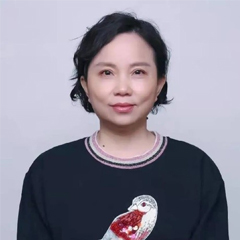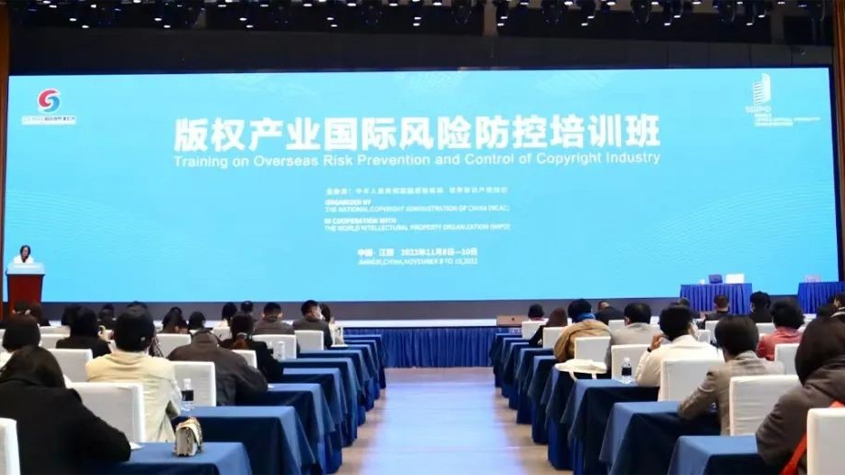WIPO China: International Copyright Forum and Training on Overseas Risk Prevention and Control of Copyright Industry Held in Jingdezhen
November 13, 2022
From November 8 to 11, the World Intellectual Property Organization (WIPO) and the National Copyright Administration of China (NCAC) jointly organized the 2022 International Copyright Forum and the 2022 Training on Overseas Risk Prevention and Control of Copyright Industry in Jingdezhen, Jiangxi Province. Ms. Sylvie Forbin, Deputy Director General of WIPO, Mr. Zhang Jianchun, Vice Minister of the Publicity Department of CPC Central Committee (CPCCC), Ms. Liu Hua, Director of WIPO Office in China, Mr. Wang Zhicheng, Director General and Ms. Zhao Xiuling, Deputy Director General of the Copyright Department of the CPCCC attended and addressed the above events.


Ms. Sylvie Forbin expressed that the cultural and economic value of creative industries has become ever more significant in today's world. The 15-year plan (2021-2035) on IPR Development adopted by the Government of China includes concrete objectives and targets for the development of copyright system and creative industries. She commended the importance the NCAC has attached to the promotion of the role of copyright in fostering the development of creative industries through best practices and regarded the organization of the 2022 International Copyright Forum in Jingdezhen, the capital of porcelain and one of the most well-known porcelain production centers in China and in the world as a good example.
Ms. Forbin emphasized that one of the Strategic Pillars of the WIPO Medium Term Strategic Plan is supporting governments, enterprises, communities, women and youth to use IP as a tool for growth and sustainable development. WIPO looks forward to seeing more and more creators, including youth and women, and creative enterprises leverage copyright effectively and successfully and to having IP continue to add cultural and economic value to both new and digital products, as well as to traditional art works and products that many developing countries are rich with.

Mr. Zhang Jianchun pointed out that copyright has both innovative and cultural attributes, and has natural advantages in promoting the development of creative industries and the creative transformation and development of outstanding Chinese traditional culture. Both the development of creative industries and the promotion of cultural prosperity require copyright protection as a prerequisite and guarantee, and cannot be achieved without the assistance and support of copyright work.
Mr. Zhang said that Jingdezhen is a famous historical and cultural city with profound heritage, and has made explorations and accumulated valuable experiences in promoting the transformation and upgrading of the ceramic industry, helping cultural prosperity and industrial development with copyright protection in recent years. He said that the NCAC is willing to strengthen exchanges and cooperation with various countries and parties, use the power of copyright to stimulate cultural innovation and creativity, and promote the deepening of civilizational exchanges and mutual appreciation among countries around the world.

Ms. Liu Hua mentioned that China is the most significant example of copyright protection in developing countries. Nantong Home Textiles industry, Dehua Porcelain industry and Wujiang Silk industry are the three "best cases of enhanced copyright protection promoting industry development" established by WIPO in China, and also good examples of telling the Chinese copyright stories. WIPO is a golden knowledge asset, providing five sets of golden keys such as policy forum, registration systems, databases, cooperation platforms and capacity building platform, contributing to the development of innovation and intellectual property in China.

During the forum, the WIPO Best Case Study on "IP and Creative Industry: Jingdezhen Story" and the pilot program of copyright protection and promotion of folklore were launched, and the theme exhibitions of the WIPO Best Case Studies, copyright protection of folklore and the implementation of the Marrakech Treaty were held.
More than 200 representatives from some national copyright authorities, oversea copyright verification institutions, and relevant Chinese domestic ministries, local copyright offices, collecting societies, as well as industries and academia participated in the Forum online and offline.

In the Opening speeches on November 8, Ms. Liu Hua noted that enhancing the awareness and ability to prevent and control overseas risks is a must for China's creative and copyright industry to grow stronger and go global. WIPO will assist and support all parties, especially SMEs, woman and youth to make more effective use of IP to achieve sustainable development. Ms. Zhao Xiuling said that copyright, as an important factor of production and wealth resource, is playing an increasingly critical role in promoting economic development, and an international risk prevention and control system should be built for the development of the copyright industry at the levels of government, enterprises and industry associations.

Experts and scholars from the Ministry of Commerce of China, the APRA AMCOS, the China Braille Press, the Zhongnan University of Economics and Law, the International Confederation of Societies of Authors and Composers, the Music Copyright Society of China, the China Written Works Copyright Society exchanged their views on hot issues of international IP protection, international business environment for copyright industries, prevention and control of risks in "going global" of music and online literature and the implementation of the Marrakech Treaty. About 90 participants from local copyright offices, publishing houses, copyright collecting societies, film and television companies and cultural institutions from all over China attended the training and received the certificates jointly issued by WIPO and NCAC.